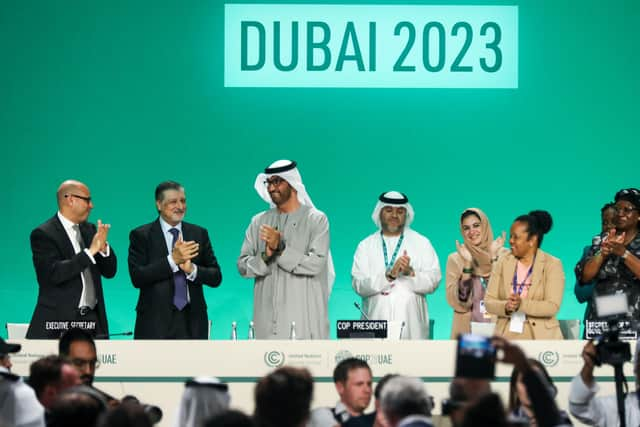COP28 climate summit's failings have amplified calls for fossil fuel version of Nuclear Non-Proliferation Treaty – Dr Richard Dixon
Things are getting back to normal in Expo City Dubai, now that the 85,000 delegates for COP28 climate summit have headed back home after nearly two weeks of difficult negotiations. The talks ran over by about 24 hours and reactions to the final agreements varied from enthusiasm to condemnation.
Many groups and countries took the final agreement in Dubai to be a step forward. A big step forward if you believe the controversial president of the COP, also the chair of the UAE state oil company. The beginning of the end for the fossil fuel era, according to the UN. A small step in the right direction for many campaigning groups. But Greta Thunberg called it “yet another example of extremely vague and watered down texts full of loopholes that in no way is even close to being sufficient for staying within the 1.5C limit and ensure climate justice”.
Advertisement
Hide AdAdvertisement
Hide AdFor the first ten days of talks, the phrase “phase out fossil fuels” was in the text being negotiated for the final agreement but, with less than two days to go, it disappeared overnight to be replaced by the much weaker “calls on” countries to “contribute to... transitioning away from fossil fuels in energy systems in a just, orderly and equitable manner”. This is what ended up in the final Dubai agreement.


COP28 deal encourages burning more gas
Some over-excited commentators celebrated this by saying that it was the first time that fossil fuels have been mentioned in a COP final agreement. But of course, although it took 26 meetings, fossil fuels did finally get a mention in the Glasgow talks two years again, where the final agreement called for accelerated efforts “towards the phasedown of unabated coal power and phase-out of inefficient fossil fuel subsidies”.
You can see why people want to find some hope within the process. There was some good news on renewable energy ambitions, energy efficiency pledges and the creation of the loss and damages fund. But on the biggest issue, fossil fuels, the Dubai agreement doesn’t really take us any further forward. In fact, it links a whole set of loopholes to any reduction in fossil fuels. It encourages switching to “low-carbon fuels” – code for burning more gas – and specifically encourages more nuclear power, carbon capture and storage, and hydrogen made from natural gas.
Will the agreement made in Dubai actually change things? The president of the COP was back to talking about his plans to increase oil production as soon as the talks were finished.
World is heating up
The weak commitments, lack of firm timescales, gaping loopholes and lack of funding to make change have amplified calls for a Fossil Fuel Non-Proliferation Treaty. Modelled on the Nuclear Non-Proliferation Treaty, the new treaty would end new exploration for oil and gas, phase out existing resources and help deliver a just transition to clean energy.
If we were in the 1990s, then something as weak as the Dubai agreement might have indeed been a step forward, but instead we are in 2023, the hottest year ever recorded, heading into what is expected to be an even hotter year.
We needed strong, immediate actions to flow from COP28, not fine talk of the beginning of the end.
Dr Richard Dixon is an environmental campaigner and consultant
Comments
Want to join the conversation? Please or to comment on this article.